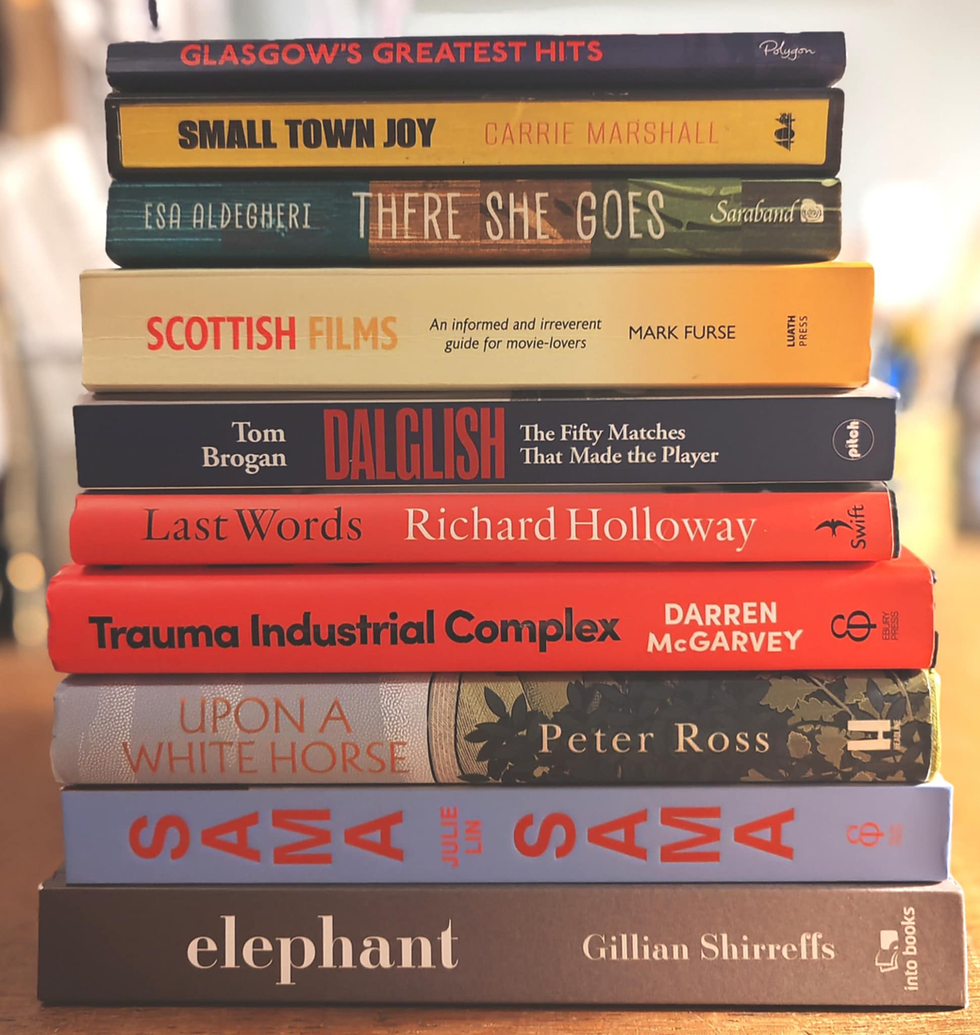Take Two: A Review Of Kirstin Innes’ Fishnet…
- Alistair Braidwood

- Aug 27, 2018
- 4 min read

If ever a novel deserved a long life it is Kirstin Innes‘ Fishnet. A winner of The Guardian’s Not The Booker Prize, and one of The Independent’s Top 10 Debut Fiction Books of 2015, it was, like far too many others, a casualty of the liquidation of Freight Books. So it is most welcome news that it is being republished by Black & White Publishing, in a beautiful new edition, which makes it the perfect time to republish the SWH! review of Fishnet from 2015*. Having read it again, we stand by every word:
As if confirmation was needed, the 50 Shades phenomenon proved once more that when it comes to fiction, sex sells. It was also a timely reminder that there are too few novelists prepared to write seriously about sex. This is particularly true with regard to the sex industry and those who work in it, both of which are all too often stigmatised and stereotyped without a second thought.
Kirstin Innes’ novel Fishnet gives the subject the serious consideration it deserves, and in doing so she has written a book which will challenge the reader, making them reassess what they thought they knew as it refuses to offer easy answers but raises many uncomfortable questions. If after reading you haven’t reviewed your own attitudes, to the selling of sex and so much more, then I’m afraid it says more about you than it does Fishnet.
Over four years in the writing, Innes has spoken about how the research for Fishnet challenged and changed her own thoughts as she interviewed women who were involved in the industry in one way or another. As the book makes apparent, this is a world which by necessity has to be secretive and suspicious, and to be able to write so convincingly about it suggests an all too rare rigour in the research and a responsibility to the subject.
This care is clear as every character is individual, with their own back stories and diverse opinions on life as well as work. By creating blogs, websites, social media, and including accompanying comments, Innes creates this diversity in a manner which is easy to identify with and completely believable. Such characterisation may seem like a given for any decent novel, but consider the stereotypes all too easily applied to sex workers, neatly expressed in that title, Fishnet, and you’ll realise how rare this is.
The investigation in the novel is being carried out by Fiona Leonard, a woman looking for her missing sister Rona who disappeared aged 20 leaving Fiona to bring up Rona’s daughter as her own. Although she has never given up hope of finding her the trail has gone cold, before a disturbing case of mistaken identity leads her to people, places and possibilities she had either never considered, or had simply filed into easy tabloid categories. What she discovers in turn fascinates, horrifies and angers her, and the story moves from being about a missing person to an examination of society, politics and gender, all through the muddied prism of attitudes towards sex.
As it becomes increasingly clear that Rona had been working as an escort and prostitute, Fiona becomes determined to discover what drew her into this world. As she learns more, she finds it difficult to correlate the people she meets with the world she imagines they inhabit. She comes to realise that while the secrets and lies make it difficult for her to gain access and trust, behind the masks and pseudonyms are people who are as ordinary and extraordinary as anyone else, and that the biggest problems are social, political, and legal, rather than with any group of individuals.
In the last 15 years there have been many non-fiction books which have looked at the increasing sexualisation of modern culture, including Natasha Walters’ Living Dolls: The Return of Sexism, Ariel Levy’s Female Chauvinist Pigs: Women and the Rise of Raunch Culture and Laurie Penny’s Meat Market: Female Flesh Under Capitalism. By looking at the themes of these books, and others, in the format of fiction Innes brings a more nuanced and engaging exploration of the subject than is normally the case, and Fishnet is a great example of what the best fiction can do. It marries an honesty and clarity which is uncomfortable, and often shocking, with a tenderness and warmth for the central characters and concern for their predicaments.
Fishnet will challenge perceptions about the subject across the board, from the dyed in the wool right-wing reactionary to the most right-on, left-leaning, liberal as all easily defined points of view are challenged. The writing is reminiscent of the investigative style of Andrew O’Hagan, with Innes’ research supporting and adding to the story rather than overshadowing it, something which lends the novel an authenticity that it may not have had otherwise.
It is not simply about sex, (how could it be?) but asks further questions about objectification and subjectification, gender politics, and the possibility of change in the future. Once the book is finished it will stay with you for some time as you try to work out exactly what you think. It is not easy, and nor should it be. Other writers should take note as such a serious subject demands serious consideration and receives it all too rarely. Not just a good book, but an important one, and one which I hope finds the wide readership it deserves. (*A version of this review was first published on SWH!, 10/6/2015)
Fishnet is published by Black & White Publishing.
You can also find the audio version of the book on Audible.
In 2015 we spoke to Kirstin Innes about the writing of Fishnet for the SWH! Podcast:









Comments